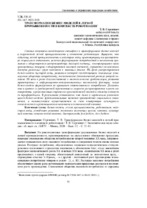| dc.contributor.author | Сергиевич, Т. В. | ru |
| dc.coverage.spatial | Минск | ru |
| dc.date.accessioned | 2021-01-28T13:29:03Z | |
| dc.date.available | 2021-01-28T13:29:03Z | |
| dc.date.issued | 2020 | |
| dc.identifier.citation | Сергиевич, Т. В. Трансформация бизнес-моделей в легкой промышленности в контексте роботизации = Transformation of business models in light industry in the context of robotization / Т. В. Сергиевич // Экономическая наука сегодня : сборник научных статей / Белорусский национальный технический университет, Факультет технологий управления и гуманитаризации, Кафедра «Экономика и право» ; редкол.: С. Ю. Солодовников (гл. ред.) [и др.]. – Минск : БНТУ, 2020. – Вып. 12. – С. 73-81. | ru |
| dc.identifier.uri | https://rep.bntu.by/handle/data/84875 | |
| dc.description.abstract | Статья посвящена исследованию специфики и трансформации бизнес-моделей в современной легкой промышленности в контексте роботизации. Выявлено, что субъекты легкой промышленности и индустрии моды ориентированы на производство социального отношения, включая формирование потребностей и механизмов признания и общественного воспроизводства знаковой системы, конструирование связи производимых товаров с общепринятой знаковой системой, управление механизмами доступа различных групп населения к знаковым благам. На фоне распространения бизнес-модели быстрой моды, развитию которой способствовали социальные (становление общества потребления), экономические (экономический рост во второй половине XX века и рост благосостояния) и технологические (роботизация, развитие транспортных и информационно-коммуникационных технологий) факторы, новые бизнес-модели формируются по принципам ответственного потребления. Доказано, что в кратко- и среднесрочной перспективе их широкое распространение и рост маловероятны, а рециклинговые стратегии производителей тканей и одежды останутся периферийными. В результате установлено, что даже в кардинально различающихся бизнес-моделях фундаментальным является производство социального отношения, а капитализация осуществляется за счет конвертации культурного, символического и репутационного капиталов в экономический капитал. | ru |
| dc.language.iso | ru | ru |
| dc.publisher | БНТУ | ru |
| dc.title | Трансформация бизнес-моделей в легкой промышленности в контексте роботизации | ru |
| dc.title.alternative | Transformation of business models in light industry in the context of robotization | ru |
| dc.type | Article | ru |
| local.description.annotation | The article is devoted to the study of the specifics and transformation of business models in modern light industry in the context of robotization. It was revealed that the subjects of the light industry and the fashion industry are focused on the production of social relations, including the formation of needs and mechanisms for the recognition and social reproduction of the sign system, the construction of the connection of manufactured goods with the generally accepted sign system, management of the mechanisms of access of various groups of the population to sign goods. Against the background of the spread of the business model of fast fashion, the development of which was facilitated by social (the formation of a consumer society), economic (economic growth in the second half of the 20th century and the growth of welfare) and technological (robotization, the development of transport and information and communication technologies) factors, new business models are formed according to the principles of responsible consumption. It has been proven that in the short and medium term, their widespread and growth are unlikely, and the recycling strategies of fabric and clothing manufacturers will remain peripheral. As a result, it was found that even in radically different business models, the production of social relations is fundamental, and capitalization is carried out through the conversion of cultural, symbolic and reputation capital into economic capital. | ru |

